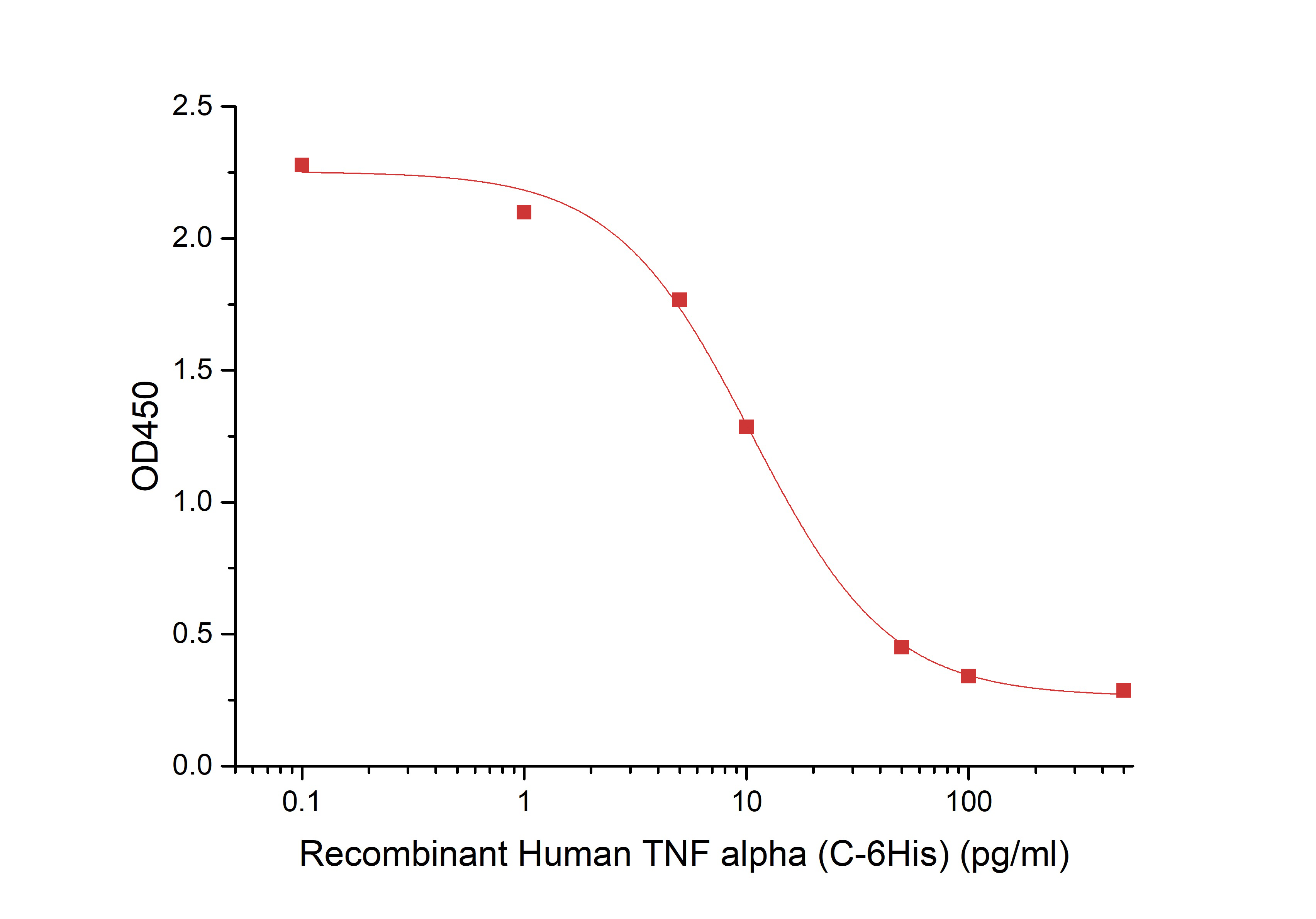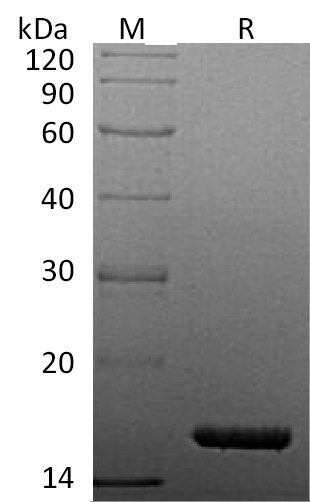购物车
- 全部删除
 您的购物车当前为空
您的购物车当前为空

TNF alpha Protein, Human, Recombinant (aa 77-233, His) is expressed in E. coli expression system with C-6xHis tag. The predicted molecular weight is 16 KDa and the accession number is P01375.

| 规格 | 价格 | 库存 | 数量 |
|---|---|---|---|
| 10 μg | ¥ 340 | 5日内发货 | |
| 50 μg | ¥ 820 | 5日内发货 | |
| 500 μg | ¥ 4,700 | 5日内发货 | |
| 1 mg | ¥ 6,720 | 5日内发货 |
| 生物活性 | Measured in a cytotoxicity assay using L‑929 mouse fibroblast cells in the presence of the metabolic inhibitor actinomycin D. The ED50 for this effect is 10-40 pg/ml. (QC verified)  |
| 产品描述 | TNF alpha Protein, Human, Recombinant (aa 77-233, His) is expressed in E. coli expression system with C-6xHis tag. The predicted molecular weight is 16 KDa and the accession number is P01375. |
| 种属 | Human |
| 表达系统 | E. coli |
| 标签 | C-6xHis |
| 蛋白编号 | P01375 |
| 别名 | 肿瘤坏死因子,Tumor Necrosis Factor Ligand Superfamily Member 2,Tumor Necrosis Factor,TNF-α,TNFSF2,TNF-Alpha,TNF-a,TNFA,TNF α,TNF,Cachectin |
| 氨基酸序列 | Val77-Leu233 |
| 蛋白构建 | Val77-Leu233 |
| 蛋白纯度 | Greater than 95% as determined by reducing SDS-PAGE. (QC verified)  |
| 分子量 | 16 KDa (reducing condition) |
| 内毒素 | < 0.1 ng/µg (1 EU/µg) as determined by LAL test. |
| 缓冲液 | Lyophilized from a solution filtered through a 0.22 μm filter, containing 20 mM Tris-HCl, 150 mM NaCl, pH 8.0. |
| 复溶方法 | Reconstitute the lyophilized protein in distilled water. The product concentration should not be less than 100 μg/ml. Before opening, centrifuge the tube to collect powder at the bottom. After adding the reconstitution buffer, avoid vortexing or pipetting for mixing. |
| 存储 | Lyophilized powders can be stably stored for over 12 months, while liquid products can be stored for 6-12 months at -80°C. For reconstituted protein solutions, the solution can be stored at -20°C to -80°C for at least 3 months. Please avoid multiple freeze-thaw cycles and store products in aliquots. |
| 运输方式 | In general, Lyophilized powders are shipping with blue ice. Solutions are shipping with dry ice. |
| 研究背景 | Tumor Necrosis Factor-α (TNF-α) is secreted by macrophages, monocytes, neutrophils, T-cells, and NK-cells following stimulation by bacterial LPS. Cells expressing CD4 secrete TNF-α while cells that express CD8 secrete little or no TNF-α. Synthesis of TNF-α can be induced by many different stimuli including interferons, IL2, and GM-CSF. The clinical use of the potent anti-tumor activity of TNF-α has been limited by the proinflammatory side effects such as fever, dose-limiting hypotension, hepatotoxicity, intravascular thrombosis, and hemorrhage. Designing clinically applicable TNF-α mutants with low systemic toxicity has been of intense pharmacological interest. Human TNF-α that binds to murine TNF-R55 but not murine TNF-R7, exhibits retained anti-tumor activity and reduced systemic toxicity in mice compared with murine TNF-α, which binds to both murine TNF receptors. Based on these results, many TNF-α mutants that selectively bind to TNF-R55 have been designed. These mutants displayed cytotoxic activities on tumor cell lines in vitro and have exhibited lower systemic toxicity in vivo. Recombinant Human TNF-α High Active Mutant differs from the wild-type by amino acid subsitution of amino acids 1-7 with Arg8, Lys9, Arg10 and Phe157. This mutant form has been shown to have increased activity with less inflammatory side effects in vivo. |